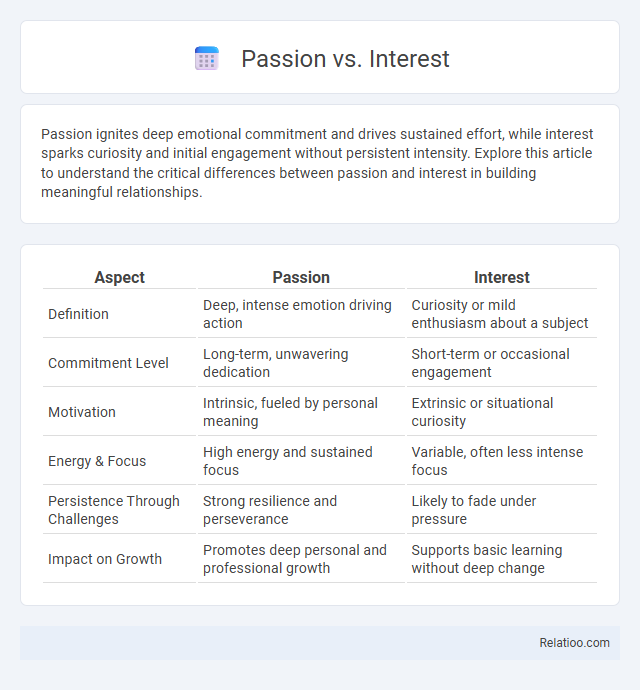Passion ignites deep emotional commitment and drives sustained effort, while interest sparks curiosity and initial engagement without persistent intensity. Explore this article to understand the critical differences between passion and interest in building meaningful relationships.
Table of Comparison
| Aspect | Passion | Interest |
|---|---|---|
| Definition | Deep, intense emotion driving action | Curiosity or mild enthusiasm about a subject |
| Commitment Level | Long-term, unwavering dedication | Short-term or occasional engagement |
| Motivation | Intrinsic, fueled by personal meaning | Extrinsic or situational curiosity |
| Energy & Focus | High energy and sustained focus | Variable, often less intense focus |
| Persistence Through Challenges | Strong resilience and perseverance | Likely to fade under pressure |
| Impact on Growth | Promotes deep personal and professional growth | Supports basic learning without deep change |
Understanding Passion and Interest
Understanding passion and interest is crucial for personal growth and fulfillment. Passion drives deep emotional engagement and long-term commitment, while interest often reflects curiosity or enjoyment without intense dedication. You can leverage your interests to discover true passions that fuel motivation and resilience in your goals.
Key Differences Between Passion and Interest
Passion drives intense, long-term motivation and deep emotional commitment, while interest tends to be more casual, temporary, and curiosity-based. Your passion often shapes life decisions and career paths, reflecting personal values and purpose, whereas interests can change frequently and spark exploration without the same level of dedication. Understanding these key differences helps you prioritize activities that fuel sustained growth and satisfaction over fleeting enthusiasm.
Signs You’re Experiencing Passion
Experiencing passion is marked by an intense, unwavering focus on a specific activity or goal that consistently energizes and motivates you throughout the day. Signs include losing track of time, feeling deeply engaged or fulfilled, and a strong desire to overcome challenges related to your pursuit. Your passion drives sustained effort and emotional investment, distinguishing it from fleeting interests or casual hobbies.
How to Recognize Genuine Interest
Recognizing genuine interest involves observing consistent engagement and curiosity in a subject or activity, rather than fleeting excitement or surface-level involvement. Your authentic interest will manifest as a deep desire to explore, learn, and improve over time, often accompanied by sustained motivation despite challenges. Identifying when your focus is driven by true interest rather than temporary passion or casual hobby ensures long-term fulfillment and purposeful growth.
The Role of Passion in Personal Growth
Passion fuels personal growth by driving sustained motivation and deep engagement in activities that align with your core values. Unlike fleeting interest or mere hobby, passion creates a strong emotional connection that cultivates resilience and perseverance through challenges. This intense commitment accelerates skill development and fosters a growth mindset essential for meaningful self-improvement.
Interest as a Catalyst for Learning
Interest acts as a powerful catalyst for learning by sparking curiosity and motivating you to explore new subjects with enthusiasm. Unlike passion, which is often intense and long-term, interest can evolve and expand, providing a consistent drive for knowledge acquisition. This dynamic engagement enhances retention and deepens understanding, making learning both enjoyable and effective.
Can Interest Evolve into Passion?
Interest often serves as the initial spark that can develop into passion through sustained engagement and emotional investment. Neuroscientific studies reveal that repeated exposure and positive experiences related to a subject increase dopamine levels, reinforcing motivation and gradually transforming casual interest into deep passion. This evolution depends largely on personal values, intrinsic curiosity, and the fulfillment derived from challenges and growth within the area of interest.
Navigating Career Choices: Passion vs Interest
Navigating career choices requires understanding the distinction between passion, interest, and aptitude to ensure long-term satisfaction and success. Your passion fuels motivation and resilience, while your interests provide areas for exploration and growth, and aptitude determines your natural capabilities within a field. Aligning these elements strategically can help you make career decisions that are both fulfilling and viable.
Balancing Passion and Interest for Fulfillment
Balancing passion and interest is essential for long-term fulfillment, as passion drives deep commitment while interest sustains curiosity and adaptability. Cultivating both allows individuals to pursue meaningful goals without burnout, leveraging passion's intensity with interest's flexibility. Research highlights that integrating diverse interests with core passions enhances motivation, creativity, and overall life satisfaction.
Tips for Cultivating Passion and Nurturing Interest
Passion drives deep commitment and long-term pursuit of goals, while interest provides initial curiosity that can develop over time; nurturing interest involves consistent exploration and engagement with new experiences to discover what resonates. Cultivating passion requires setting clear objectives, embracing challenges, and fostering a growth mindset to maintain motivation during setbacks. Regular reflection, seeking feedback, and surrounding oneself with supportive communities amplify passion and transform fleeting interest into enduring dedication.

Infographic: Passion vs Interest
 relatioo.com
relatioo.com